
Solid Earth Sciences
Scope & Guideline
Transforming knowledge into action for Earth's future.
Introduction
Aims and Scopes
- Geochemistry and Mineralogy:
Research on the chemical composition, properties, and processes affecting minerals and rocks, including studies on trace elements, isotopic compositions, and mineral genesis. - Geological and Tectonic Processes:
Investigations into the dynamics of Earth's crust, including tectonic movements, fault mechanisms, and the formation of geological structures. - Hydrogeology and Groundwater Studies:
Exploration of groundwater resources, including hydrogeochemical assessments, groundwater modeling, and the impact of geological formations on water availability. - Petrology and Geochronology:
Studies focused on the origin, evolution, and age of rocks and minerals, utilizing techniques such as U-Pb dating and geochemical analysis to understand Earth's history. - Remote Sensing and Geophysical Applications:
Utilization of advanced technologies such as GIS, remote sensing, and seismic imaging to analyze geological features and resource potential.
Trending and Emerging
- Sustainable Resource Management:
Increasing attention is being paid to studies that explore sustainable methods for resource extraction and environmental management, highlighting the importance of balancing resource use with ecological preservation. - Geochemistry of Rare Elements:
There is a growing interest in the geochemistry of rare and critical elements, particularly in the context of their economic potential and the implications of their extraction from geological deposits. - Climate Change and Earth Processes:
Research that examines the interactions between geological processes and climate change is on the rise, reflecting the urgent need to understand how earth systems respond to environmental shifts. - Advanced Analytical Techniques:
The use of sophisticated analytical methods, including high-precision isotopic analysis and advanced imaging techniques, is becoming increasingly prevalent, allowing for more detailed and accurate geological investigations. - Interdisciplinary Approaches:
Research that integrates various scientific disciplines, such as biology, chemistry, and physics, to address complex geological questions is gaining momentum, indicating a trend towards holistic understanding of earth processes.
Declining or Waning
- Traditional Geophysical Methods:
There has been a noticeable decline in papers focusing solely on conventional geophysical methods like basic seismic studies or gravity measurements, as newer, integrated approaches gain traction. - Generalized Hydrogeology:
Research that provides broad overviews of hydrogeological conditions without specific case studies or detailed analyses seems to be less frequent, as more targeted studies become the norm. - Static Geological Models:
Papers presenting static models of geological formations without considering dynamic processes or changes over time are becoming less common, indicating a shift towards more dynamic and integrated modeling approaches.
Similar Journals

Journal of Himalayan Earth Sciences
Advancing Knowledge in Himalayan Earth SciencesThe Journal of Himalayan Earth Sciences (ISSN: 1994-3237; E-ISSN: 2305-6959) is a distinguished publication by UNIV PESHAWAR, dedicated to advancing knowledge in the field of earth sciences, particularly as they relate to the Himalayan region. Established in 2013, this journal aims to provide a platform for researchers, professionals, and students to share original research findings, reviews, and innovative methodologies that contribute to the understanding of geological and environmental phenomena in this ecologically significant area. Despite being categorized in Q4 of the Earth and Planetary Sciences, the journal showcases valuable contributions to the scientific community and encourages submissions that delve into both the challenges and advancements within Earth sciences, with a particular focus on the unique geological structures and processes of the Himalayas. As an open-access journal, it ensures that research is accessible to a global readership, promoting collaboration and discussion among scholars and practitioners. The journal's operational base in Peshawar, Pakistan, places it at the heart of Himalayan research, making it an invaluable resource for those invested in earth sciences.

DOKLADY EARTH SCIENCES
Fostering Collaboration in Earth and Planetary DiscoveriesDOKLADY EARTH SCIENCES is a reputable journal published by MAIK NAUKA/INTERPERIODICA/SPRINGER, focusing on the dynamic field of Earth and Planetary Sciences. With an ISSN of 1028-334X and E-ISSN 1531-8354, this journal offers a platform for researchers to disseminate their findings and insights that contribute to our understanding of Earth systems over a continuous publishing span from 1998 to 2024. It currently holds a Q3 quartile ranking in the Earth and Planetary Sciences category, reflecting an emerging yet significant impact within its field, evidenced by its Scopus ranks where it stands at 123rd in general Earth sciences and 113th in miscellaneous Earth sciences. DOKLADY EARTH SCIENCES aims to bridge research gaps and foster collaboration among a diverse audience including researchers, professionals, and students committed to advancing knowledge in geoscience. The journal stands as a vital resource for those seeking to explore contemporary challenges and innovations within the realm of Earth sciences.
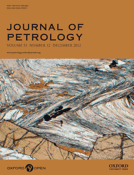
JOURNAL OF PETROLOGY
Exploring the Depths of Geochemistry and PetrologyJOURNAL OF PETROLOGY is a prestigious academic journal published by Oxford University Press, dedicated to the fields of geochemistry, petrology, and geophysics. Established in 1960, it has garnered significant recognition within the scientific community, currently holding an impressive Q1 ranking in both Geochemistry and Petrology as well as Geophysics, as of 2023. The journal is indexed in Scopus, ranking 20th out of 165 in Geophysics and 31st out of 154 in Geochemistry and Petrology, reflecting its high impact and contribution to Earth and Planetary Sciences. Designed for researchers, professionals, and students, the journal publishes cutting-edge research and reviews that advance our understanding of igneous and metamorphic processes, mineralogy, and the Earth's structure. With a commitment to rigor and scientific excellence, JOURNAL OF PETROLOGY serves as a vital resource for developing new concepts and methodologies in the study of Earth’s materials and processes.
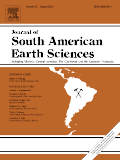
JOURNAL OF SOUTH AMERICAN EARTH SCIENCES
Fostering Insights into Earth's Dynamic ProcessesJOURNAL OF SOUTH AMERICAN EARTH SCIENCES is a premier interdisciplinary journal dedicated to publishing high-quality research in the fields of Earth-Surface Processes, Geology, and Paleontology, making it an essential resource for scientists and researchers focused on South American geology and its diverse geological phenomena. Published by Pergamon-Elsevier Science Ltd in the United Kingdom, this journal has been instrumental in disseminating groundbreaking studies since 1988, showcasing contributions that push the boundaries of knowledge in Earth and Planetary Sciences. With an impressive Scopus ranking—positioning it in the 74th percentile for Paleontology and 71st for Geology—this journal not only reflects robust academic quality but also its commitment to addressing critical geological challenges in South America. Researchers will appreciate its objective of advancing understanding of geological processes while providing insights into past, present, and future Earth environments. Although available through traditional subscription models, the journal's vast repository of articles enriches the academic landscape, facilitating the sharing of vital research among professionals, students, and geological practitioners.

Environmental Earth Sciences
Advancing knowledge for a sustainable Earth.Environmental Earth Sciences is a prestigious journal published by Springer, dedicated to advancing knowledge in the multifaceted fields of Earth Sciences, including Earth-Surface Processes, Environmental Chemistry, Geology, and Soil Science. With an ISSN of 1866-6280 and an E-ISSN of 1866-6299, this journal occupies a notable position in the academic landscape, consistently ranked in the Q2 category across multiple disciplines in 2023. It supports open access to foster wider dissemination of impactful research, enhancing visibility and accessibility for authors and readers alike. The journal's ongoing commitment to publishing innovative studies and reviews makes it an essential resource for researchers, professionals, and students alike. With a strong focus on addressing contemporary environmental challenges, Environmental Earth Sciences invites contributions that are both original and interdisciplinary, making a significant impact in understanding Earth dynamics and sustainability.
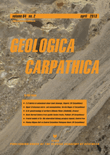
GEOLOGICA CARPATHICA
Pioneering Research in Earth and Planetary SciencesGEOLOGICA CARPATHICA, with ISSN 1335-0552 and E-ISSN 1336-8052, is a distinguished open access journal published by the Slovak Academy of Sciences Geological Institute, serving as a pivotal platform for the dissemination of research in the field of Geology. Established in 1991 and continuing through 2024, the journal is recognized for its significant contributions to Earth and Planetary Sciences, evidenced by its 2023 Scopus ranking placing it in the second quartile (Q2) within Geology. With an H-index that showcases its impactful publications, GEOLOGICA CARPATHICA is committed to fostering scholarly communication while promoting accessible research, having adopted an open access model since 2009. Located in beautiful Bratislava, Slovakia, this journal aims to engage a global audience of researchers, professionals, and students interested in ecological, geological, and environmental studies, making it a prominent resource for enriching the scientific community's understanding of the Carpathian region and beyond.
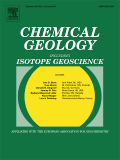
CHEMICAL GEOLOGY
Advancing Geochemical Insights for a Sustainable FutureChemical Geology is an esteemed international journal published by Elsevier, dedicated to the rigorous exploration of geochemistry and petrology, with its foundational roots tracing back to 1966. As evidenced by its impressive Q1 ranking in both Geochemistry and Petrology as well as Geology in the 2023 category quartiles, this journal stands as a premier outlet for cutting-edge research and innovative methodologies within these vital fields. With a Scopus rank placing it in the top 10% of Earth and Planetary Sciences, Chemical Geology offers a platform for researchers, professionals, and students alike to disseminate findings that advance our understanding of geological processes and materials. Although it does not currently offer open-access options, the journal remains committed to high-quality publications that contribute significantly to the scholarly community. Located in the vibrant academic milieu of Amsterdam, Netherlands, Chemical Geology is an essential resource for those engaged in the earth sciences, aiming to bridge theoretical insights with practical applications.

GEOCHEMISTRY GEOPHYSICS GEOSYSTEMS
Pioneering Research for a Deeper Understanding of Earth's ProcessesGEOCHEMISTRY GEOPHYSICS GEOSYSTEMS, published by the American Geophysical Union, is a leading open-access journal that has been at the forefront of advancing our understanding of earth sciences since its inception in 2000. With an impressive open access policy established in 2022, the journal promotes the wide dissemination of high-quality research in the fields of Geochemistry and Geophysics. Boasting a Q1 ranking in both Geochemistry and Petrology, as well as Geophysics, in the 2023 Journal Rankings, it is recognized among the top journals in its categories, positioning itself at the cutting edge of scientific inquiry. The journal has also secured notable rankings in Scopus, placing it in the 83rd percentile for Geophysics and the 71st percentile for Geochemistry and Petrology, reflecting its impact and relevance within the scientific community. Located in Washington, DC, GEOCHEMISTRY GEOPHYSICS GEOSYSTEMS serves as a vital resource for researchers, professionals, and students dedicated to the exploration of the complex interactions of geochemical and geophysical processes.

IZVESTIYA-PHYSICS OF THE SOLID EARTH
Innovating Insights into Geological ProcessesIZVESTIYA-PHYSICS OF THE SOLID EARTH, published by MAIK NAUKA/INTERPERIODICA/SPRINGER, serves as a pivotal platform in the field of Earth and Planetary Sciences as well as Environmental Science. With an ISSN of 1069-3513 and E-ISSN 1555-6506, the journal has been disseminating influential research since its inception in 1996, and continues to extend its contributions through 2024. Currently ranked in the Q3 category for both Earth and Planetary Sciences and Environmental Science, it showcases innovative studies that are crucial for understanding geological processes and their environmental implications. Located at 233 Spring St, New York, NY 10013-1578, the journal appeals to researchers, professionals, and students by providing insights and advancements that are at the forefront of these significant scientific disciplines. Although not open access, its rigorous peer-reviewed articles are essential reads for those aiming to deepen their knowledge and stay abreast of current trends and research in solid Earth physics.
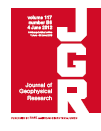
JOURNAL OF GEOPHYSICAL RESEARCH-SOLID EARTH
Exploring the Depths of Earth’s MysteriesJOURNAL OF GEOPHYSICAL RESEARCH-SOLID EARTH is a prestigious journal published by the American Geophysical Union, dedicated to advancing the study of solid Earth sciences. With an ISSN of 2169-9313 and E-ISSN of 2169-9356, it serves as a leading platform for rigorous research findings and innovative advancements within the fields of Earth and Planetary Sciences, Geochemistry and Petrology, Geophysics, and Space and Planetary Science. The journal has achieved an impressive Q1 quartile ranking across these categories, reflecting its high impact in the academic community and underscoring its role in influencing scientific discourse. Notably, it holds an esteemed position in Scopus, ranking 15th among 159 journals in Earth and Planetary Sciences (miscellaneous) as well as within the top 20 in several other geophysical domains. Researchers and practitioners are encouraged to contribute their work to this esteemed journal, which publishes comprehensive articles from 1979 to the present, thus providing a crucial repository of knowledge for those engaged in solid Earth research. Although it does not currently offer Open Access options, the journal's prestigious reputation ensures its articles reach a wide audience of academics, professionals, and students alike, fueling a deeper understanding of our planet's processes and challenges.